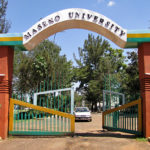Here are courses offered at JKUAT college of health sciences and the admission requirements:
Courses offered
DEGREE PROGRAMS OFFERED AT THE SCHOOL OF PUBLIC HEALTH
A. UNDERGRADUATE PROGRAMS
i. Bachelor of Science in Public Health
Description: The B.Sc. Public Health provides training that equips students with the knowledge and skills to address relevant public health concerns. Graduates from the programme are equipped with appropriate skills and knowledge to identify public health problems, design solutions to those problems, and plan and execute appropriate public health interventions.
It provides training in the range of skills involved in keeping people healthy and preventing disease, including: Assessing health and wellbeing of populations, Investigating public health problems, Assessing the health impact of policy at local, national and global level.
Career Opportunities: Graduates from this program get employment in a wide range of areas including: Hospitals, Research Institutions, Ministry of Health, Ministry of Water and Irrigation, Ministry of Environment and natural resources, Academic Institutions, United Nations , Organizations, Health Care Insurance Organizations, Non-Governmental Organizations.
Modes of Study
Fulltime:- Monday to Friday
Part-time:- Friday, Saturday and Sunday
Minimum Entry Requirements
A holder of KCSE (or equivalent examination) certificate with a minimum aggregate of C+ and minimum of C in Biology and Chemistry and C- in English/Kiswahili and Maths/ Physics.
Or
A holder of KACE with a minimum of two principal passes including Biology and subsidiary pass in Chemistry, Maths/ Physics.
Or
Be a holder of a Diploma in Public Health, Environmental Health, Clinical Medicine, Pharmacy, Community Health, Human Nutrition or the equivalent of any of these qualifications as approved by Senate.
NB: Candidates with the relevant Diploma with a minimum of a credit pass, may, at the discretion of the JKUAT Senate, be exempted from one academic year of study.
Or
Have a Higher National Diploma (HND) in Public Health, Clinical Medicine, Pharmacy, Human Nutrition, Community Health, Environmental Health or the equivalent of any of these from an Institution recognized by the University Senate.
NB: Candidates with HND, with a minimum of a credit pass may, at the discretion of the JKUAT Senate, be exempted from two academic years of study.
Or
Be a holder of any other qualification accepted by the University Senate as equivalent to any of the above.
- Bachelor of Science in Community Health and Development
Description: A Bachelor of Science course in Community Health and Development aims at producing health workers who are capable of addressing community health and developmental issues using a bottom top approach from the community level. The course also aims at producing graduates who can critically analyze community health problems with a view of suggesting and helping to implement solutions. The program prepares students to effectively plan, develop, implement and evaluate community health programs. Community health professionals work to improve the health and well-being of entire communities. Students in this program are exposed to material in health behavior, community health research, biostatistics, epidemiology, health communication and professional development.
Career Opportunities: This program is designed to prepare graduates for work in community-based and human rights organizations, Health agencies, family planning clinics, mental health centers, homeless shelters, research and development centers, and national health department, Hospital settings
Modes of Study
Fulltime:- Monday to Friday
Part-time:- Friday, Saturday and Sunday
Minimum Entry Requirements
Students wishing to study Bachelor of Science in Community Health and Development must satisfy the minimum University requirements of aggregate C+
Must have passed Biology or Biological Sciences in the KCSE at a mean grade C+. In addition, a student must have passed in any two subjects from the following alternatives, at the minimum grades shown:
Alternative A
Mathematics C
Chemistry C
Physics C
Alternative B
Mathematics C
Physical Science C
Geography/Agriculture C
OR
Have a minimum of 2 principal passes one of which must be in Biology and the other in Chemistry, Physics or Mathematics in Kenya Advanced Certificate of Education (KACE),
OR
Have a Diploma in community health and development and with at least a credit pass from an institution recognized by the University Senate. Applicants with a credit join the program at Year two.
OR
Have a Higher National Diploma in community health and development from an institution recognized by the University Senate. Applicants with a Higher National Diploma join the program at Year three.
OR
Have any other qualifications accepted by the University Senate
iii. Bachelor of Science in Health Records Management and Informatics
This course prepares graduates to be professionals who are experts in managing patient health information and medical records, administering computer information systems, and coding the diagnoses and procedures for healthcare services provided to patients. Health Records and Informatics professionals are responsible for safeguarding the most confidential patient data, including medical histories, laboratory test reports, diagnoses, treatment plans, insurance information, medications, and the notes of doctors and nurses. They work as a critical link between doctors, insurance providers and patients; they manage health records in a way that is consistent with the medical, administrative, ethical and legal requirements. Course prepares graduates to administer Electronic Medical/Health Records systems and Prepare health informatics reports that doctors, nurses, and other health care providers rely on to deliver quality
health care
Career Opportunities: Graduates from this program get employment in a wide range of areas including: Hospitals, Research Institutions, Ministry of Health, Ministry of Water and Irrigation, Ministry of Environment and natural resources, Academic Institutions, United Nations, Organizations, Health Care Insurance Organizations, Non-Governmental Organizations, Government health departments, Public and private hospitals, Community health services Research Institutions
Mode of study
Fulltime:- Monday to Friday
Part-time:- Friday, Saturday and Sunday
Minimum Entry Requirements
In addition to meeting the University requirements, candidates for admission to Bachelor of Science in Health Records and Informatics course shall be required to have obtained
Either:
i. A Kenya Certificate of Secondary Education mean grade of C+ (plus) and above with a combination of: English or Kiswahili C , Biology/Biological Sciences, C ,
Mathematics C, Physics or Chemistry 2
OR
Have a minimum of 2 principal passes in mathematics and biology in A’ Levels.
Have a Diploma in Health Records and Information Technology or any other equivalent qualification from an institution recognized by the JKUAT Senate.
Mean grade of C- (minus) at KCSE and progressed from certificate to Diploma at an institution recognized by JKUAT senate
POSTGRADUATE PROGRAMS
A. MASTER OF SCIENCE PROGRAMS
I. MASTER OF SCIENCE IN PUBLIC HEALTH
Description: The M.Sc. programme in Public Health provides multi-disciplinary field-based, problem-oriented and student-oriented training and research that deals with research methodology, Computers in Health Research, epidemiology and biostatistics. The programme will also offer training in Law ethics and human rights, Health Informatics and Travel Medicine, Environmental and occupational health and control and prevention of communicable & non-communication diseases. The programme also offers training in material and child health and nutrition and in Disaster Management.
Course prepare graduates with the knowledge and skills necessary for conducting health assessments, creating, implementing and evaluating programs, doing research and developing and advocating for policies supporting population health. Furthermore Graduates from the programme will be equipped with appropriate analytic skills and knowledge to identify public health problems and design solutions to those problems, plan and execute field-based scientific research, and have good communication skills.
Career Opportunities: Graduates assume professional positions in a variety of settings including health departments and other government agencies, academic institutions, hospitals, and other health-related organizations.
Entry Requirements
•The common regulations for all Masters Degrees in the University shall apply.
- A holder of a first degree in the following fields: Medicine (MBCHB), Nursing (BSc.N), Pharmacy (B.Pharm), Dentistry (BDS), Bachelor of Veterinary Medicine (BVM), Bsc Public Health, Medical Laboratory Sciences from JKUAT.
• A holder of at least an Upper Second Class Honours degree in, B.Sc. Environmental Health, Medical Microbiology, Biochemistry, Bsc Public Health, Medical Laboratory Sciences or Biological Sciences, from JKUAT or any other Institution recognized by JKUAT Senate.
•A holder of a Lower Second Class Honours degree in relevant course provided that the candidate produces acceptable evidence of research ability - A holder of any other qualification accepted by the University senate
Mode of study
Course work, examination and thesis
- Fulltime:- Monday to Friday
• Part-time:- Friday, Saturday and Sunday
Duration of course
2-Year programme
- MASTER OF SCIENCE IN EPIDEMIOLOGY
Description: This course prepares students to design and conduct population health studies and apply research findings to improve human health. Students learn the principles, methods, strengths and limitations of epidemiologic study designs; collaborate on applied population health research; interpret epidemiologic findings, effectively communicate research and finding to lay and professional audiences, and apply the findings to the development of evidence-based interventions to improve population health. They also gain an awareness and basic understanding of advanced statistical methods and learn to apply core and intermediate level statistical methods to public health endeavors, such as data management, statistical analysis, interpretation, and presentation of analytical results using computing technology. Moreover the course provides multi-disciplinary problem-oriented and student-oriented training and research that deals with research methodology, Epidemiological methods, Molecular epidemiology, Biostatistics and Demography, quantitative epidemiology, application of epidemiological methods and epidemiology of infectious diseases.
Career Opportunities:-Graduates are employed in government and private health agencies, industry, and research institutions.
Entry Requirements
•The common regulations for all Masters Degrees in the University shall apply.
•A holder of a first degree in the following fields: Medicine (MBCHB), Nursing (BSc.N), Pharmacy (B.Pharm), Dentistry (BDS), Bachelor of Veterinary Medicine (BVM), Bsc Public Health, Medical Laboratory Sciences from JKUAT.
• A holder of at least an Upper Second Class Honours degree in, B.Sc. Environmental Health, Medical Microbiology, Biochemistry, Bsc Public Health, Medical Laboratory Sciences or Biological Sciences, from JKUAT or any other Institution recognized by JKUAT Senate.
•A holder of a Lower Second Class Honours degree in relevant course provided that the candidate produces acceptable evidence of research ability
- A holder of any other qualification accepted by the University senate
Mode of study
Course work, examination and thesis
Fulltime:- Monday to Friday
Part-time:- Friday, Saturday and Sunday
Duration of course
2-Year programme
III. MASTER OF SCIENCE IN INTERNATIONAL HEALTH
The course provides students with a foundation in international public health principles and with competency in using the tools and methods necessary to initiate and run programmes that improve the health of poor populations in an efficient, sustainable and equitable way. The programme provides multi-disciplinary problem-oriented and student-oriented training and research that deals with research methodology, computer application in Health Research, epidemiology and biostatistics, health systems and society, Global pattern of disease among others. The course develop graduates knowledge and understanding of the major global health problems and their potential solutions; knowledge and skills in research techniques applied in the analysis of global health problems, including quantitative and qualitative research methods, health policy and systems research and public health. Graduates of International Health are able to work with the many interrelated determinants impacting human global health and disease – ranging on a scale from individual to society.
Career Opportunities:- Graduates from this program are expected to assume leadership roles in global health – be that in governments, non-governmental organisations and/or academic institutions.
Entry Requirements
•The common regulations for all Masters Degrees in the University shall apply.
- A holder of a first degree in the following fields: Medicine (MBCHB), Nursing (BSc.N), Pharmacy (B.Pharm), Dentistry (BDS), Bachelor of Veterinary Medicine (BVM), Bsc Public Health, Medical Laboratory Sciences from JKUAT.
• A holder of at least an Upper Second Class Honours degree in, B.Sc. Environmental Health, Medical Microbiology, Biochemistry, Bsc Public Health, Medical Laboratory Sciences or Biological Sciences, from JKUAT or any other Institution recognized by JKUAT Senate.
•A holder of a Lower Second Class Honours degree in relevant course provided that the candidate produces acceptable evidence of research ability - A holder of any other qualification accepted by the University senate
Mode of study
Course work, examination and thesis
- Fulltime:- Monday to Friday
• Part-time:- Friday, Saturday and Sunday
• Duration of course
• 2-Year programme
B. DOCTOR OF PHILOSOPHY (PhD) PROGRAMS
Doctor of Philosophy in Public Health, Epidemiology and International Health
Entry Requirements
Masters degree in relevant areas
Mode of Study
Course work, examination and thesis
• Fulltime:- Monday to Friday
• Part-time:- Friday, Saturday and Sunday
Duration of course
3-Year programme
Contact Information
The Dean School of Public Health
Jomo Kenyatta University of Agriculture and Technology
PO BOX 62000-00200
Nairobi Kenya
Tel: 067(52711) Fax 067-52030
Email: [email protected]


















